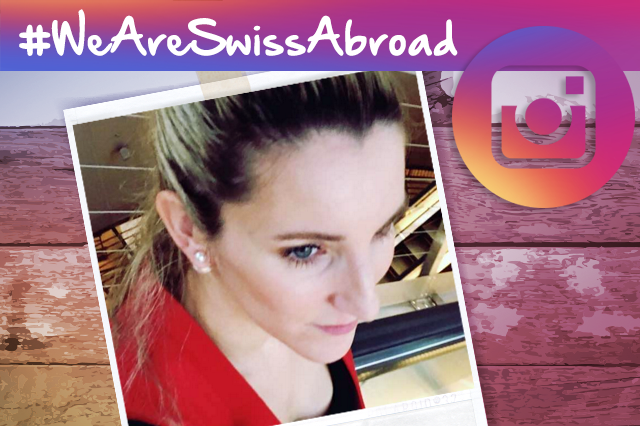Swiss watches for the mega-city Tokyo
Luca Orduña, 27, put all his eggs in one basket. At the age of 22, he went to Japan for the first time and set himself up in business. Fascinated by the varied cuisine and the natural environment, this adventurous entrepreneur still isn’t thinking about returning to Switzerland. As the manager of a company that distributes Swiss clocks and watches, he nevertheless maintains close links with his home.
swissinfo.ch: When and why did you leave Switzerland?
Luca Orduña: My parents own a travel agency in Zurich, meaning that even when I was small, I had the chance to explore the world. I developed a passion for Asian cultures and languages at an early age. During my studies in St. Gallen I attended a course on Japanese culture and was fascinated by this multi-faceted culture.
During the course, I became aware for the first time of the Swiss-Japanese Chamber of Trade (SJCC). It offered a fellowship to young Swiss who wanted to add a year in Japan to their studies. I immediately applied and was lucky enough to win a grant. So I went to Japan at the age of 22 for the first time.
swissinfo.ch: How were the first months in Japan?
L.O.: I was enthusiastic about the variety on offer in terms of culture, cuisine and travel destinations. I soon realised, however, that the language is without doubt the biggest barrier, and there was no way around learning Japanese if I really wanted to integrate. This often led to moments of frustration in the first months, as the language is extremely difficult to learn because of the characters.

swissinfo.ch: What is your work?
L.O.: After my fellowship and the year in Japan, the big question was “what next?” At exactly that time, a colleague contacted me with the idea of setting up our own company. The idea was to found a distribution company for Asia focused on Swiss clock and watch brands.
Our founding team consisted of four: my business partner founded the head office in Switzerland, there was one person in Hong Kong and one in Taiwan, and I was responsible for setting up the Japanese branch, SwissPrimeBrands Japan. We are the exclusive distributors and representatives of three clock and watch brands: Qlocktwo, Favre-Leuba and Romain Gauthier.
It has been an extremely intense and educational experience for me to set up a company from scratch in an alien culture, to hire people and build customer contacts.
swissinfo.ch: It can’t have been easy to set up a business in Japan as a foreigner just a year after finishing your studies.
L.O.: It was a unique constellation and opportunity, and I put all my eggs in this one basket. We saw a distinct need for a distribution company that had close links to Switzerland and represents Swiss clock and watch brands in Asia. What’s more, we had a keen team with the right resources.
Through my previous work experience and my knowledge of Japanese, I already had a good professional network in Japan, which made starting out easier. The biggest challenge was to build a network of customers. In Japan, customer relations are extremely important. That’s why it often takes a lot of patience and years of hard work to get a chance. For a young business it’s not always easy, of course.
swissinfo.ch: What kind of reception do Swiss clocks and watches get in Japan? Is there a lot of competition from Japan or other countries?
L.O.: Japan is both competition for the Swiss clock and watch industry and one of the top consumers of Swiss-made clocks and watches. Alongside Hong Kong, the US and China, it is one of the best markets for clocks and watches.
In my view the Japanese have a very developed understanding of quality and value brands with a long tradition. That means Swiss clocks and watches have high credibility and visibility in Japan.
On the question of competition, it depends very heavily, of course, on what price range we are talking about. The competition for quartz watches is much bigger and comes from Japan too. The Japanese invented the quartz watch, triggering a major crisis for the Swiss watch industry around 1970. In terms of mechanical clocks and watches, Switzerland remains No. 1 worldwide.
swissinfo.ch: What do you find about Japan more attractive than Switzerland?
L.O.: I find the whole environment very exciting, with Tokyo-Yokohama as the biggest metropolitan area in the world, and further urban areas such as Osaka-Kobe-Kyoto, Fukuoka, etc. But I also value what the country has to offer in the way of nature. Thanks to the four distinct seasons, there are snowy mountains with ski regions in the winter and in summer there are warm lakes and the sea for water sports and swimming.
Luca Orduña geniesst eine Runde Wasserski auf dem Kawaguchi-See.
This is made all the more attractive by the fact that the air in Japanese cities is clean and the infrastructure, including public transport, is excellent, so weekend expeditions are uncomplicated. Tokyo is one of the safest and cleanest cities in the world, which is admirable given its size.
But what most impresses me is the Japanese dining culture. Countless restaurants serve the best of Japanese and world cuisine. I like the fact that food is generally shared in Japan, which makes dining more sociable. A variety of dishes are placed in the middle of the table and you can try a bit of everything.
swissinfo.ch: You are well-integrated into the Japanese economy. Are there still moments where you are nevertheless taken by surprise? What is the biggest difference to Switzerland?
L.O.: Working in Japan is a daily challenge to me and I’m constantly forced to leave my comfort zone. I speak only Japanese with my colleagues and customers. But even after five years in Japan, there are still moments where I don’t grasp the finer points of the language.
Japanese is very contextual; your relationship to the other person, their status and their age must always be taken into account. This means it is sometimes hard for me to get to the point and give clear instructions. Sometimes I miss the ability to “think outside the box” and to come up with new, innovative solutions instead of just improvements. I miss a certain flexibility.
swissinfo.ch: Where do you currently live, and how is your life there?
L.O.: At the moment I’m living in central Tokyo. I’m always amazed by how many new restaurants there are in the area and I enjoy discovering new restaurants. I have the impression that it will never be possible to try out all the restaurants.
Luca Orduña (r.) mit einem Freund auf der berühmten Shibuya-Kreuzung.
I live quite close to the famous Shibuya Crossing. But despite the crowds, the city never seems hectic to me because everyone is very considerate.
I am also enthusiastic about Swiss activities in Japan and notice a strong sense of community. The Swiss Embassy, the chamber of commerce and other organisations put on weekly events, from networking to lecture series and sake tastings. This enriches my daily life and is a good opportunity to swap notes with Swiss people and with people interested in Switzerland. Japan and Switzerland have excellent business and bilateral relations. It’s my aim to strengthen these further.
swissinfo.ch: What are your long-distance thoughts about Switzerland?
L.O.: Switzerland is and will remain my home. As a Swiss, it is important to me to be able to sell a Swiss product in Japan and to maintain daily contact with colleagues in Switzerland. Inviting my Japanese customers to the Basel watch fair is a highlight.
From a distance I realise that Switzerland offers very good training and professional conditions. I think that apprenticeships, for example, are an important cornerstone of that, and one of the reasons why Switzerland is very competitive internationally. Living abroad, I see again and again that Switzerland enjoys a very high reputation internationally and that this is very advantageous to the country.
swissinfo.ch: Do you participate in Swiss elections and referendums? By post or by e-voting?
L.O.: I see the right to vote as a privilege and try to keep up with proposals and elections. I vote by post, I wasn’t aware of the e-voting option but would warmly welcome that.
swissinfo.ch: What do you most miss about Switzerland?
L.O.: My family and friends. No matter how long I live in Japan, I will remain a foreigner here. I miss sitting at a barbecue on the balcony overlooking Lake Zurich.
Are you a Swiss citizen living abroad? Label your Instagram photos with #WeAreSwissAbroadExternal link.

In compliance with the JTI standards
More: SWI swissinfo.ch certified by the Journalism Trust Initiative













You can find an overview of ongoing debates with our journalists here . Please join us!
If you want to start a conversation about a topic raised in this article or want to report factual errors, email us at english@swissinfo.ch.